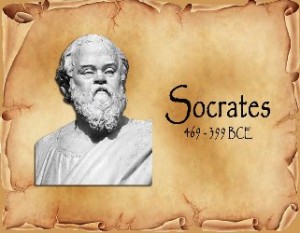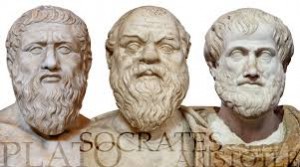
Socrates was a Greek thinker and teacher born in 469 B.C. in the deme Alopeke on the slopes of Mount Lycabettus — a short walk to Athens. He was put to death in 399 B.C. He was the son of Sophroniscus, a sculptor, and his mother, Phaenarete, a midwife. At the time of Socrates’ birth, Athens was a cultural center and in the midst of celebrating victory over the Persians. Athenians were full of new ideas, which they expressed in philosophy, mathematics, plays, performances, rhetoric, oratory, the gymnasium, music, architecture, sculpture, and art. As a boy, he received a classical Greek education in music, gymnastics, and grammar, and he decided to become a sculptor like his father. Socrates married Xanthippe (described by the ancients as a shrew) and had three sons; two were still young when Athens put Socrates to death at the age of seventy. The only time that he left Athens was to serve honorably as a hoplite soldier in the Peloponnesian War (431 B.C.-404 B.C.). Socrates apprenticed to his father as a sculptor until one day — when he was a middle-aged man — Socrates’ friend, Chaerephon, asked the Delphic oracle if any man was wiser than Socrates (Chaerephon put his question to the oracle approximately 430 B.C.). The Pythian priestess — seated on a tripod — would go into a trance and utter the God’s (Apollo’s) answer, which was then interpreted by an attending priest. The oracle replied, “No one is wiser” than Socrates! Thereafter, in the belief, he had no wisdom — Socrates set out on a questioning mission to find someone wiser than himself.
 His examination of his fellow citizens and foreigners was the fulfillment of his divine mission. His wisdom was secular; his daemon or spiritual voice advised him on actions that he should not take. Socrates lived in an era of polytheism; however, at times he referred to “god” not “the gods”. He was a model citizen, and Xenophon tells us that he sacrificed on both the public altars of the city and the private altar of his own home. Socrates studied with Archelaus (who was a student of Anaxagoras), and since Socrates wrote nothing, we learn about him through the pen of others: the pre-Socratic philosophers, Parmenides of Elea, his student Plato, Plato’s student Aristotle, the playwright Aristophanes, the third-century A.D. biographer Diogenes Laertius, and the military general Xenophon. Philosophy began in ancient Greece, and we are the heirs today as modern “lovers of wisdom” — and we know that even a little philosophy is good for the soul.
His examination of his fellow citizens and foreigners was the fulfillment of his divine mission. His wisdom was secular; his daemon or spiritual voice advised him on actions that he should not take. Socrates lived in an era of polytheism; however, at times he referred to “god” not “the gods”. He was a model citizen, and Xenophon tells us that he sacrificed on both the public altars of the city and the private altar of his own home. Socrates studied with Archelaus (who was a student of Anaxagoras), and since Socrates wrote nothing, we learn about him through the pen of others: the pre-Socratic philosophers, Parmenides of Elea, his student Plato, Plato’s student Aristotle, the playwright Aristophanes, the third-century A.D. biographer Diogenes Laertius, and the military general Xenophon. Philosophy began in ancient Greece, and we are the heirs today as modern “lovers of wisdom” — and we know that even a little philosophy is good for the soul.
For further information, please purchase a copy of Joan’s book, Socrates, Jesus and Freedom. Copyright © 2016 by Joan Arnsteen
